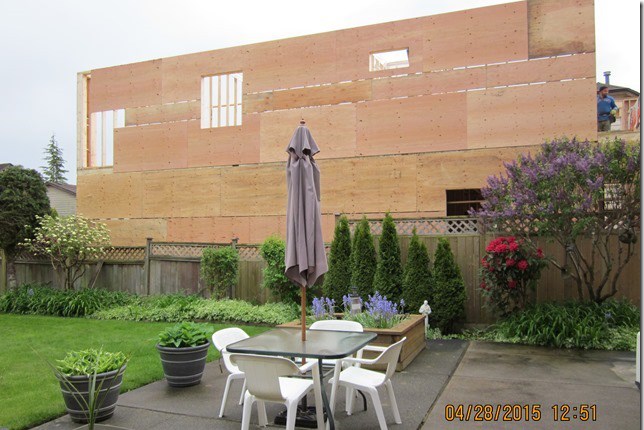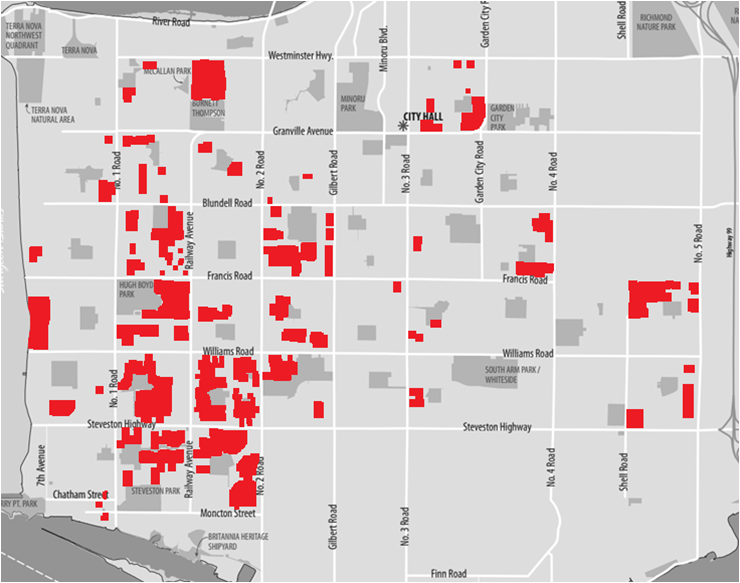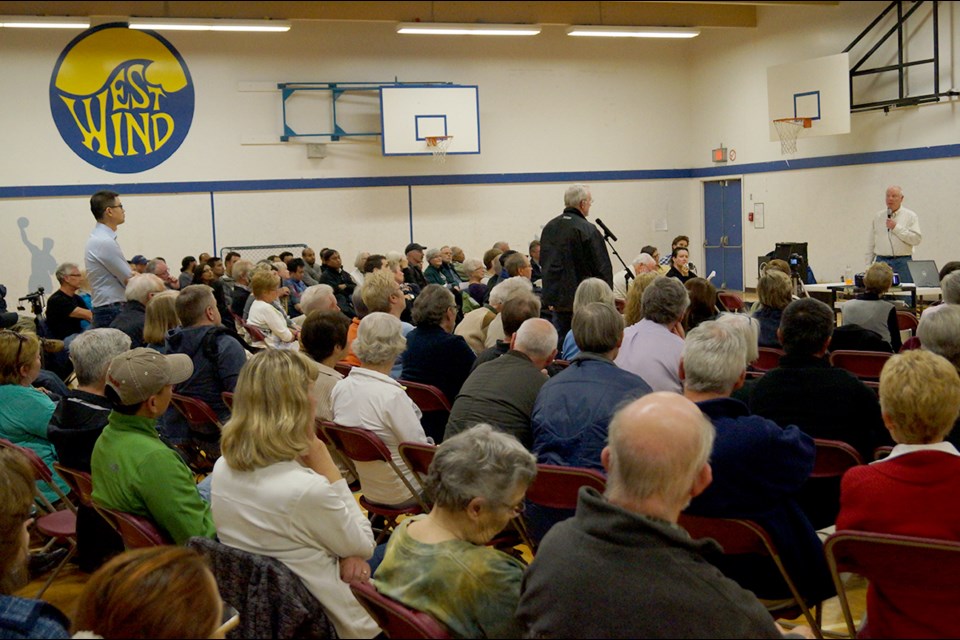Things got a little less than neighbourly in the school gym of Westwind elementary where about 100 residents of the area came to talk about megahomes rising up around them.
The meeting was called by real estate agent Lynda Terborg and the Westwind Ratepayers Association to galvanize Richmond residents to demand the City of Richmond to ramp up enforcement of home size restriction bylaws and extinguish land-use contracts. (The contracts, as they stand, allow developers to build homes significantly larger than is permitted by city bylaws.) While most in the crowd seemed to be onside with the organizers, a number of developers who are building the types of megahomes in question, were also there, ready to swing back.
In fact, part-time homebuilder Rocky Mangat, an appliance retailer in Vancouver and Richmond resident, challenged Terborg’s allegiances.
“You’re playing both sides of the fence,” said Mangat, as he held up an email written by Terborg, in February, telling a potential client that a Westwind property for sale has the opportunity for a “big rebuild.”
After the meeting, Terborg told the Richmond News, “I’m a realtor. I make no bones about telling people that,” noting she was merely stating facts for her client.
Ratepayer Graham Johnson noted the city’s Official Community Plan calls on continuing “to protect single-family neighbourhoods,” and one of the stated goals of Richmond First councillors (Bill McNulty, Linda McPhail and Derek Dang) is “balancing growth while protecting the character of single-family neighborhoods.”
“That doesn’t seem to be reflected in some of the construction,” stated Johnson to the crowd void of city councillors and officials.

At issue is the fact — according to Graham, Terborg and others — that the city is failing to enforce its own bylaws regarding house height and size restrictions.
But moreover, a number of properties throughout Richmond exist under old land-use contracts, that have never been amended to include certain amended bylaws regarding height and size.
“Walls are being erected along people’s backyards,” said Terborg.
Mangat said he agrees bylaws must be followed, but he argued that extinguishing the land-use contracts (and thus bringing the properties under city bylaws) for single-family homes will ruin property values.
“My mother lives on a property (with a land-use contract) and she’s counting on that value for her retirement,” he told the audience at the Westwind elementary gym.
Mangat and his colleagues who attended the town hall meeting, including prominent developers Ajit Thaliwal and Raman Kooner (who combined to donate $20,000 to Richmond First last election), met with city planners on Thursday to express their views.
“We agree there are a lot of ugly homes being built, but this is (a result of) very few people in the homebuilder network,” said Mangat.
“A lot of people bought these (land-use contract) lots because they have these contracts on them,” said Kooner, who expressed concerns about the rights of homeowners and called for community dialogue including all stakeholders.
On Monday Mayor Malcolm Brodie announced the city would begin the process of extinguishing land-use contracts. The process will require public consultation and the earliest the city claims the contracts could be extinguished is 2016.

Notably, the contracts will expire in 2024 at any rate; the city is merely — potentially — expediting the issue.
Gordon Price is an urban planner, development consultant and former Vancouver NPA councilor who now is now the director of the City Program at Simon Fraser University.
He said land-use contracts initially acted as a sort of “envelope” for the size of homes back in the 1970s. The development that is occurring now is a result of people trying to maximize the size of homes — essentially the hot real estate market has pushed home sizes to the brink of what is allowed.
Price contends if land-use contracts are extinguished there would likely be a hit to property values in the short term.
“However if properties are on an even playing field, the market would adjust,” said Price who speculated the 36,000 other homes dictated by city bylaws could theoretically rise in value (with all other market factors excluded).
Terborg contends each home is different and must be assessed based on its unique criteria (such as location), and a land-use contract and/or home size alone doesn’t necessarily mean higher value.
Another issue for her is how the neighbourhood looks aesthetically; because land-use contracts can exist on one side of a street and not the other, it may result in neighbourhoods becoming a hodgepodge of different sized homes.
Price said a hodgepodge of housing may or may not be detrimental to the housing values in a particular neighbourhood.
He said what is “probably more critical” than an aspect such as the shape of a roof, is open space on a lot, noting aspects such as gardens and privacy are factors to consider.
“There are values that are as important, if not more, than just the short term price of housing,” said Price.
Terborg is also asking the city for the reinstatement of design controls, via a design panel.
“We want fair play for all and for everyone to live by the same rules,” she said.
Mangat agreed, in part.
“As far as the sizing of homes we have to respect the realities. …Immigrant families need these big homes. As far as character goes, let’s sit down to discuss it,” said Mangat.
He noted “in the same boat of fairness there has to be some sort of compensatory action for these property owners,” should land-use contracts be extinguished.
Furthermore, cries for a moratorium on home builds while the city amends its bylaws, as suggested by Terborg, would put people out of jobs, said Kooner.
City of Richmond spokesperson Ted Townsend said under new provincial legislation the land-use contacts can be extinguished via a public hearing without the expressed consent of each individual property owner. Nor is there any requirement for the city to compensate those affected by the changes, he said.



